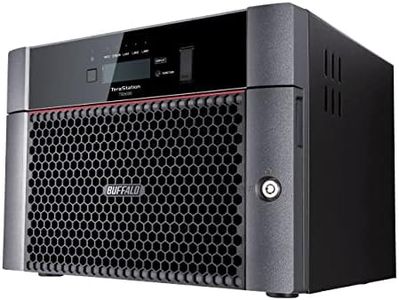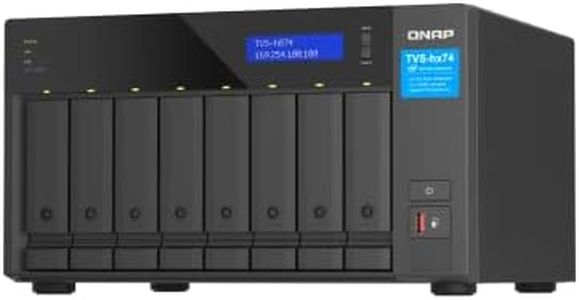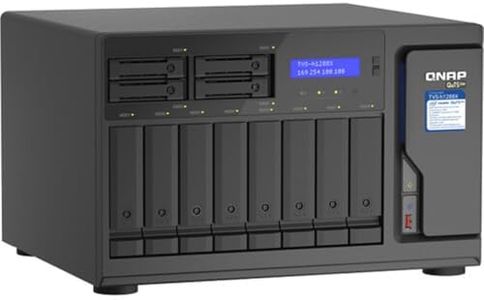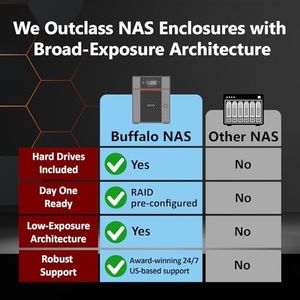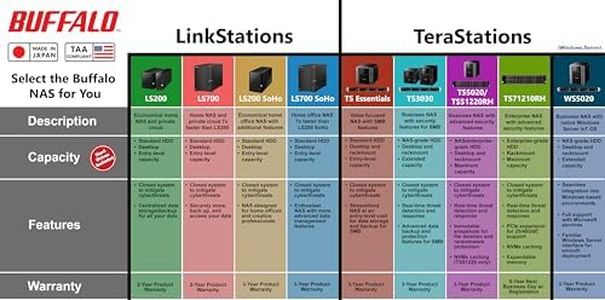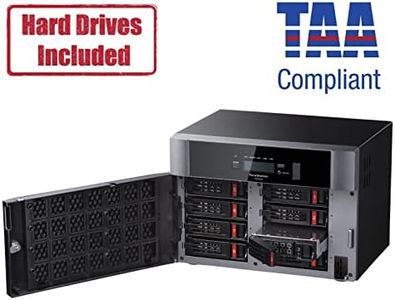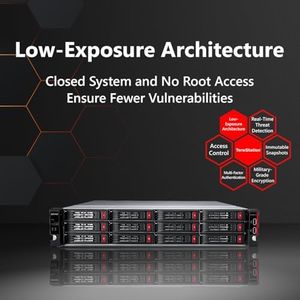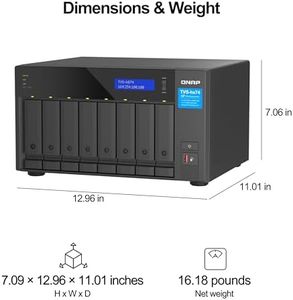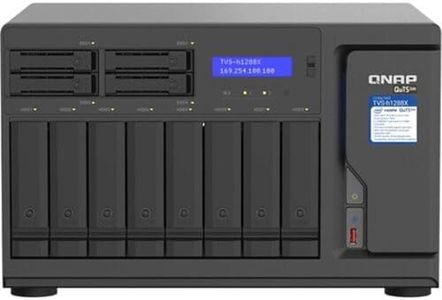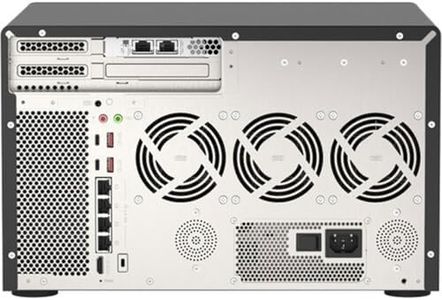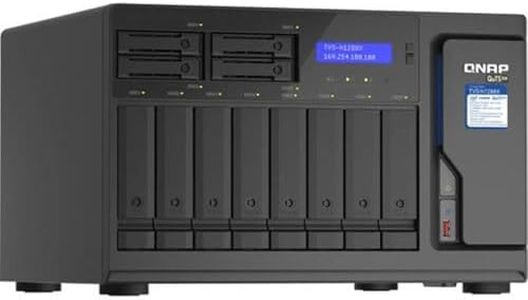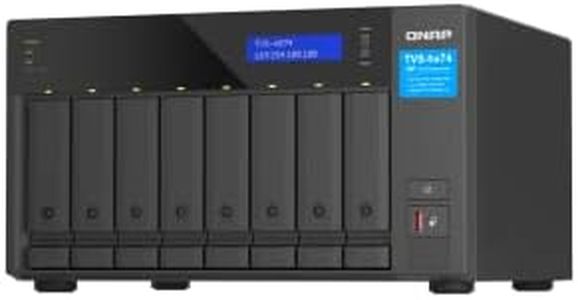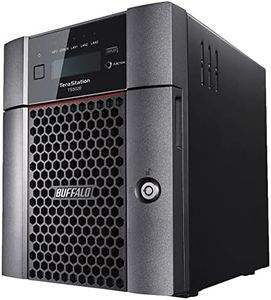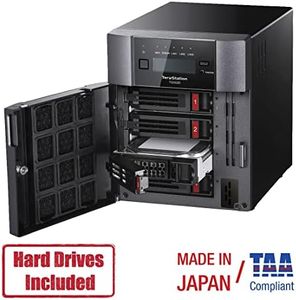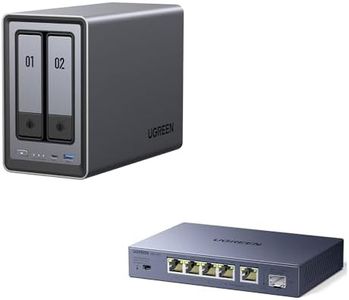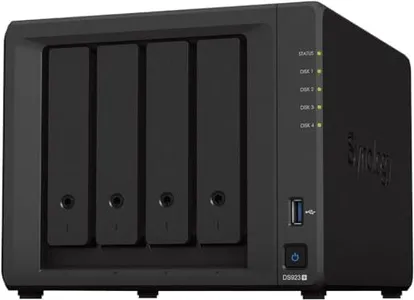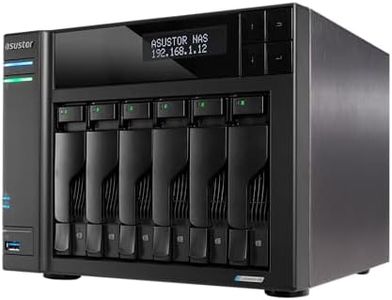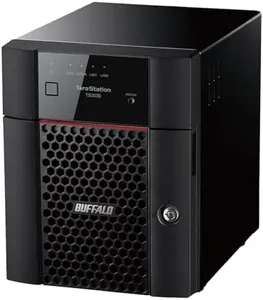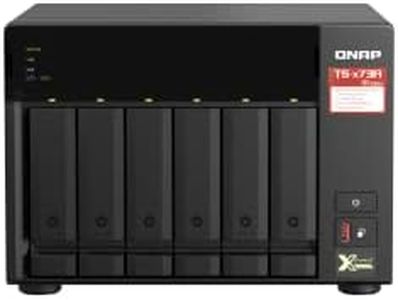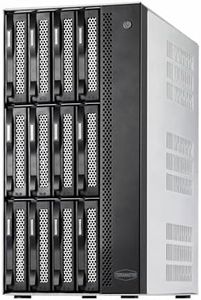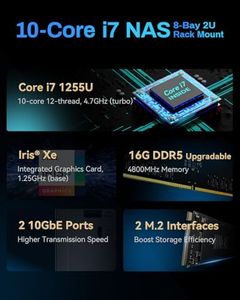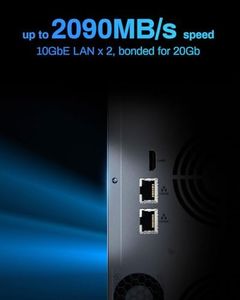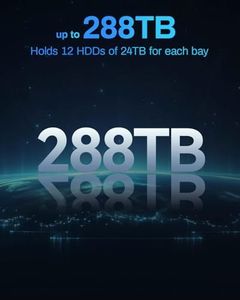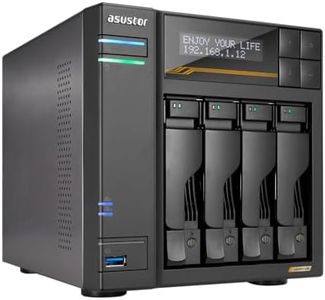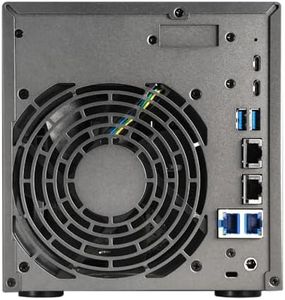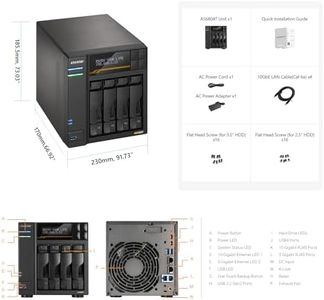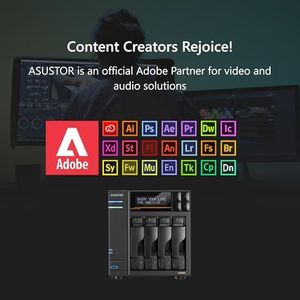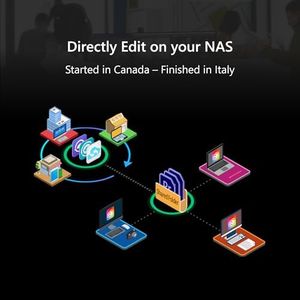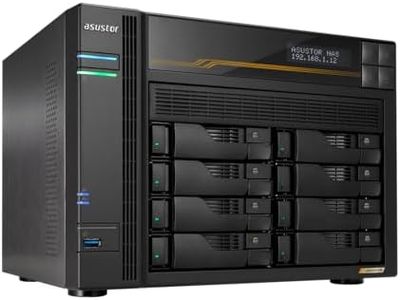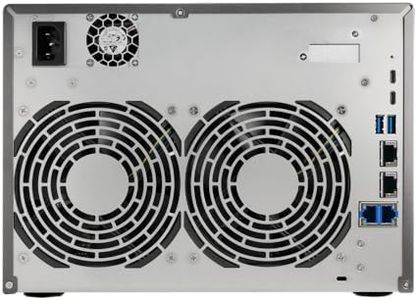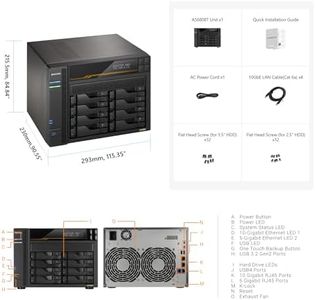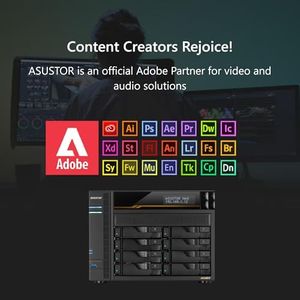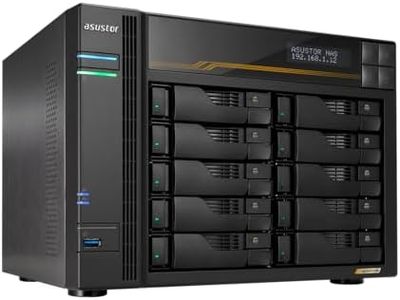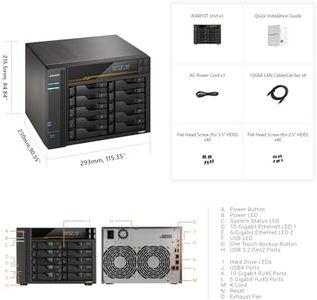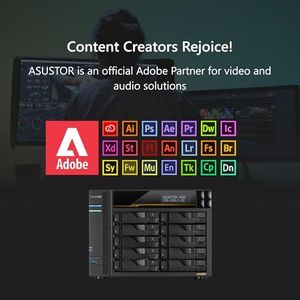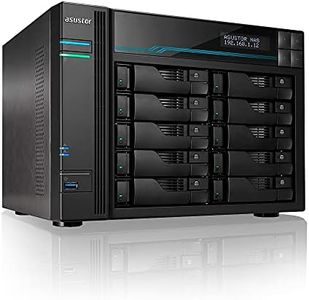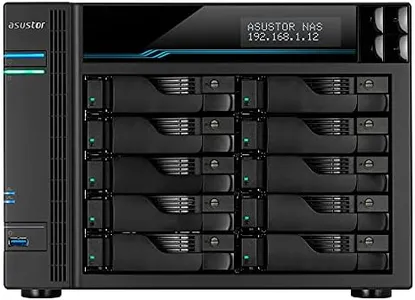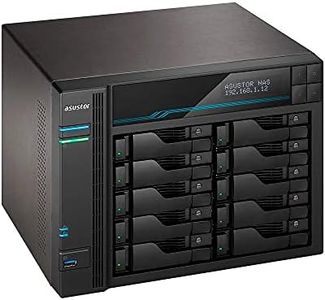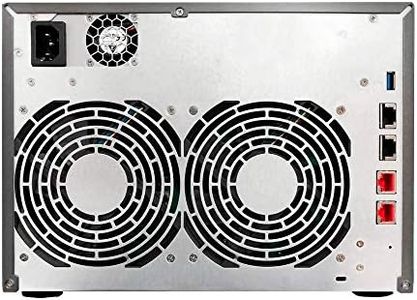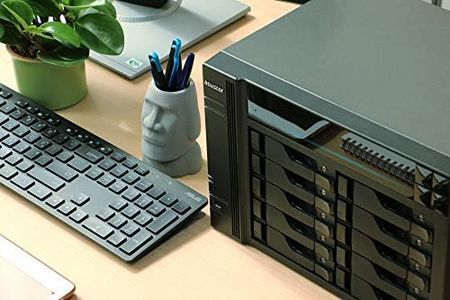10 Best Nas Servers 2026 in the United States
Winner
BUFFALO TeraStation 5820DN 8-Bay Business Desktop NAS 160TB (8x20TB) with Hard Drives Included RAID iSCSI Network Storage File Server
The BUFFALO TeraStation 5820DN is a solid choice for businesses needing a large and reliable network storage solution. It comes with 8 bays, each preloaded with 20TB NAS-grade hard drives, giving you a massive raw capacity of 160TB. Configured in RAID 6 out of the box, it offers about 120TB of usable space with good data protection, which is ideal for critical business data. The device supports RAID configurations, allowing flexibility depending on your needs for speed or redundancy.
Most important from
3 reviews
QNAP TVS-h874X-i9-64G-US 8 Bay High-Speed Desktop NAS with 12th Gen Intel® Core™ CPU, 64GB DDR4 RAM, 10GbE & 2.5 GbE Networking and PCIe Gen 4 expandability (Diskless)
The QNAP TVS-h874X-i9-64G-US is a powerful 8-bay NAS designed for users who need fast, reliable storage with plenty of room for expansion. It comes diskless, allowing you to choose your preferred hard drives, supporting large storage setups. The 12th Gen Intel Core i9 processor combined with 64GB of DDR4 RAM offers strong performance, making it well suited for heavy multitasking, virtualization, and demanding file operations. Dual M.2 NVMe SSD slots help speed up access by enabling SSD caching.
Most important from
92 reviews
QNAP TVS-h1288X-W1250-16G High-speed media NAS with Intel® Xeon® W-1250 CPU and Two 10GbE Ports
The QNAP TVS-h1288X-W1250-16G is a robust NAS server designed for users needing high-speed media storage and advanced functionality. With an Intel Xeon W-1250 6-core processor and 16GB of ECC RAM, it offers strong performance for handling multiple tasks and users simultaneously, making it suitable for small to medium businesses or tech-savvy home users. The server boasts 12 bays, providing ample storage capacity, which can be expanded further with RAID support for data redundancy and security, a crucial feature for anyone concerned about data loss.
Most important from
53 reviews
Top 10 Best Nas Servers 2026 in the United States
Winner
BUFFALO TeraStation 5820DN 8-Bay Business Desktop NAS 160TB (8x20TB) with Hard Drives Included RAID iSCSI Network Storage File Server
BUFFALO TeraStation 5820DN 8-Bay Business Desktop NAS 160TB (8x20TB) with Hard Drives Included RAID iSCSI Network Storage File Server
Chosen by 1341 this week
QNAP TVS-h874X-i9-64G-US 8 Bay High-Speed Desktop NAS with 12th Gen Intel® Core™ CPU, 64GB DDR4 RAM, 10GbE & 2.5 GbE Networking and PCIe Gen 4 expandability (Diskless)
QNAP TVS-h874X-i9-64G-US 8 Bay High-Speed Desktop NAS with 12th Gen Intel® Core™ CPU, 64GB DDR4 RAM, 10GbE & 2.5 GbE Networking and PCIe Gen 4 expandability (Diskless)
QNAP TVS-h1288X-W1250-16G High-speed media NAS with Intel® Xeon® W-1250 CPU and Two 10GbE Ports
QNAP TVS-h1288X-W1250-16G High-speed media NAS with Intel® Xeon® W-1250 CPU and Two 10GbE Ports
QNAP TVS-h874-i5-32G-US 8 Bay High-Speed Desktop NAS with M.2 PCIe Slots, 12th Gen Intel Core CPU, up to 64GB DDR4 RAM, 2.5 GbE Networking and PCIe Gen 4 expandability (Diskless)
QNAP TVS-h874-i5-32G-US 8 Bay High-Speed Desktop NAS with M.2 PCIe Slots, 12th Gen Intel Core CPU, up to 64GB DDR4 RAM, 2.5 GbE Networking and PCIe Gen 4 expandability (Diskless)
BUFFALO TeraStation 5420DN 4-Bay Business Desktop NAS 40TB (2x20TB) with Hard Drives Included RAID iSCSI Network Storage File Server
BUFFALO TeraStation 5420DN 4-Bay Business Desktop NAS 40TB (2x20TB) with Hard Drives Included RAID iSCSI Network Storage File Server
TERRAMASTER T12-500 Pro NAS Storage - 12Bay Core i7 1255U 10-Cores 12-Threads CPU, 16GB DDR5 RAM, Dual 10GbE Ports, Network Attached Storage Peak Performance for Business (Diskless)
TERRAMASTER T12-500 Pro NAS Storage - 12Bay Core i7 1255U 10-Cores 12-Threads CPU, 16GB DDR5 RAM, Dual 10GbE Ports, Network Attached Storage Peak Performance for Business (Diskless)
Asustor Lockerstor 4 Gen3 AS6804T, 4 Bay NAS, AMD Ryzen Quad-Core 2.3GHz, 16GB ECC DDR5, 4 M.2 NVMe Slots, Dual 5GbE & 10GbE Port, Network Attached Storage for Video & Content Creators (Diskless)
Asustor Lockerstor 4 Gen3 AS6804T, 4 Bay NAS, AMD Ryzen Quad-Core 2.3GHz, 16GB ECC DDR5, 4 M.2 NVMe Slots, Dual 5GbE & 10GbE Port, Network Attached Storage for Video & Content Creators (Diskless)
Asustor Lockerstor 8 Gen3 AS6808T 8 Bay NAS Network Storage, AMD Ryzen Quad-Core 2.3 GHz, 16GB RAM ECC DDR5, 4 M.2 NVMe Slots, Dual 5GbE & Dual 10GbE Port, USB4 Type-C, Network Attached Storage
Asustor Lockerstor 8 Gen3 AS6808T 8 Bay NAS Network Storage, AMD Ryzen Quad-Core 2.3 GHz, 16GB RAM ECC DDR5, 4 M.2 NVMe Slots, Dual 5GbE & Dual 10GbE Port, USB4 Type-C, Network Attached Storage
Asustor Lockerstor 10 Gen3 AS6810T 10 Bay NAS, AMD Ryzen Quad-Core 2.3 GHz, 16GB RAM ECC DDR5, 4 M.2 NVMe Slots, Dual 5GbE and Dual 10GbE Port, USB 4.0 Type-C, Network Attached Storage (Diskless)
Asustor Lockerstor 10 Gen3 AS6810T 10 Bay NAS, AMD Ryzen Quad-Core 2.3 GHz, 16GB RAM ECC DDR5, 4 M.2 NVMe Slots, Dual 5GbE and Dual 10GbE Port, USB 4.0 Type-C, Network Attached Storage (Diskless)
Asustor Lockerstor 10 AS6510T - 10 Bay NAS, 2.1GHz Quad-Core, 2 M.2 NVMe SSD Slot, 10GbE Port, 2.5GbE Port, 8GB RAM DDR4, Enterprise Network Attached Storage (Diskless)
Asustor Lockerstor 10 AS6510T - 10 Bay NAS, 2.1GHz Quad-Core, 2 M.2 NVMe SSD Slot, 10GbE Port, 2.5GbE Port, 8GB RAM DDR4, Enterprise Network Attached Storage (Diskless)
Our technology thoroughly searches through the online shopping world, reviewing hundreds of sites. We then process and analyze this information, updating in real-time to bring you the latest top-rated products. This way, you always get the best and most current options available.

